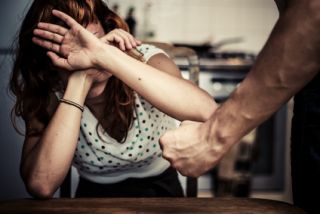Domestic Violence
The Secret Shame of Domestic Violence
The pain make-up can't cover.
Posted October 23, 2014

When the Baltimore Ravens running back Ray Rice delivered a left hook that knocked out his then-fiancee (and now wife) at a casino in Atlantic City, NJ, the incident was captured on the elevator’s surveillance video, and a second surveillance video showed Rice dragging Janay out of the elevator. When TMZ got hold of the second video and published it online, Rice became the face of domestic violence. The ramifications in the NFL and for Rice are ongoing.
Ray Rice may still be in the spotlight for domestic abuse, but he’s certainly not alone.
As the CDC reports, almost one in every three women has been slapped, pushed or shoved by their intimate partner, and nearly one in four has been “beaten, burned, choked, slammed against something or hit with a fist.” Then there are women who abuse men, like the classic image of the angry wife coming after her husband with a frying pan. Unfortunately, that also is true, but not nearly as prevalent.
I hear about it all the time: the woman who calls into my radio show with whispered pleas, asking how she can gather the strength to leave her abusive boyfriend; a man who stands before me shame-faced at one of my events, seeking help for the rage that comes out in physical violence against his wife and children; and the constant refrain of rape in all its permutations.
Domestic violence covers a wide spectrum of physical, psychological, economic, and sexual abuse. The abuse often happens in cycles, where there is a period of time in which tension escalates and some sort of violent act is committed, which is then followed by a time of reconciliation and forgiveness, often giving the victim hope that the situation has changed. It hasn’t.
When I was a young child, there was no escape possible. All I could do was bury my mother’s emotional abuse and my father’s sexual abuse deep inside me, until I spun out of control as a teen and young adult. Keeping my secret buried, even from my own consciousness, took alcohol, prescription drugs, promiscuity, extreme sports, and being a workaholic attorney. It was only when I was diagnosed with cancer, at the age of 25, that I turned my life around. I plunged into a whole new lifestyle and a whole new path opened up for my life. What I learned about recovery from abuse and addiction became my first book, Truth Heals.
Getting out from under a history of abuse takes courage and a good amount of desperation. Secrets can kill you, literally. But victims of domestic violence often suffer silently. They may be unable to leave, trapped through isolation and insecurity, lack of funds, or the desire to protect children from a potentially worse situation. The biggest reason, however, is fear and shame. So when people speak out about their experiences, it opens doors not only for themselves, but for others as well.
Take the Academy Award-winning actress Charlize Theron. Growing up in South Africa, her father was an abusive alcoholic who threatened to kill her and her mother. When she was 15 years old, her mother shot and killed her father in self-defense. Out of that trauma, Charlize became a dedicated activist. She founded a rape crisis center in South Africa, and participated in Eve Ensler’s V-Day Project to help raise awareness about abused women. It’s interesting to note that Charlize has recently been in a relationship with Sean Penn, who was charged with felony domestic assault when he was married to Madonna. The unconscious patterns we grow up with are hard to change.
A short list of celebrities who have suffered domestic violence includes Rihanna (who is finally speaking out about overcoming the shame and humiliation of her abusive relationship with Chris Brown), Halle Berry, Robin Givens, Tina Turner, Whitney Houston, Christina Aguilera, and Mariah Carey. And the list of those who have been charged or arrested for domestic violence is startling long : Charlie Sheen, Mel Gibson, Sean Penn, Nicolas Cage, Steven Seagal, Ozzy Osbourne, James Brown, Gary Busey, John Barrymore (Drew Barrymore’s father), James Caan, Dudley Moore, billionaire William Koch, and HBO chairman Chris Albrecht for starters, and that’s not even touching the list of pro athletes, heavy rockers/rappers, or the seemingly gentle New Age musician Yanni.
Yes, it can happen to anyone. And the best way to get out from under the scourge of domestic violence is by breaking the power of the secret shame and letting someone know what is going on. Speak up, and the truth can heal you.
If you or someone you know is a victim of domestic violence, call the National Domestic Violence Hotline at 1−800−799−SAFE(7233) or visit http://www.ndvh.org.


